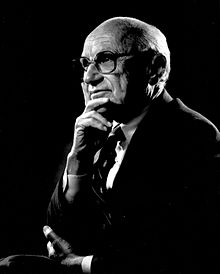Social organization
Appearance
(Redirected from Organization of society)



Social organization or group organization in sociology is a pattern of relationships between and among individuals and social groups.
Quotes
[edit]- Quotes are arranged alphabetically by author
A - F
[edit]- Social actors knowledgeably and actively use, interpret and implement rule systems. They also creatively reform and transform them. In such ways they bring about institutional innovation and transformation and shape the ‘deep structures’ of society.
- Tom R. Burns (et al.), (1987) The shaping of social organization, p. ix
- Markets are social organizations, structured and regulated by more or less well-defined social rule systems.
- Tom R. Burns (et al.), (1987) The shaping of social organization, p. 125.
- Big industry, competition and generally the individualistic organization of production have become a fetter which it must and will shatter. ... It makes unavoidably necessary an entirely new organization of society in which production is no longer directed by mutually competing individual industrialists but rather by the whole society operating according to a definite plan and taking account of the needs of all.
- Education will enable young people quickly to familiarize themselves with the whole system of production and to pass from one branch of production to another in response to the needs of society or their own inclinations. It will, therefore, free them from the one-sided character which the present-day division of labor impresses upon every individual. Communist society will, in this way, make it possible for its members to put their comprehensively developed faculties to full use. But, when this happens, classes will necessarily disappear. It follows that society organized on a communist basis is incompatible with the existence of classes on the one hand, and that the very building of such a society provides the means of abolishing class differences on the other.
- Some propose mere welfare measures – while others come forward with grandiose systems of reform which, under the pretense of re-organizing society, are in fact intended to preserve the foundations, and hence the life, of existing society. Communists must unremittingly struggle against these bourgeois socialists because they work for the enemies of communists and protect the society which communists aim to overthrow.
- Group organization is to be the new method in politics, the basis of our future industrial system, the foundation of international order. Group organization will create the new world we are now blindly feeling after, for creative force comes from the group, creative power is evolved through the activity of the group life.
- The group process contains the secret of collective life, it is the key to democracy, it is the master lesson for every individual to learn, it is our chief hope or the political, the social, the international life of the future.
- The basic problem of social organization is how to co-ordinate the economic activities of large numbers of people.
- Milton Friedman Capitalism and Freedom (1962) Ch. 1 The Relation Between Economic Freedom and Political Freedom
- The liberal conceives of men as imperfect beings. He regards the problem of social organization to be as much a negative problem of preventing "bad" people from doing harm as of enabling "good" people to do good; and, of course, "bad" and "good"people may be the same people, depending on who is judging them.
- Milton Friedman Capitalism and Freedom (1962) Ch. 1 The Relation Between Economic Freedom and Political Freedom
G - L
[edit]- Any social organization does well enough if it isn't rigid. The framework doesn't matter as long as there is enough looseness to permit that one man in a multitude to display his genius. Most so-called social scientists seem to think that organization is everything. It is almost nothing — except when it is a straitjacket. It is the incidence of heroes that counts, not the pattern of zeros.
- Social organizations are flagrantly open systems in that the input of energies and the conversion of output into further energy input consists of transactions between the organization and its environment.
- Daniel Katz & Robert L. Kahn (1966), The Social Psychology of Organizations. p. 16-17
M - R
[edit]- Do the tendencies of the present day, mass movements, social organization, publicity, public education, emphasize the unique in man, or enhance the dominance of undifferentiated man acting as mass
- Everett Dean Martin, The Conflict of the Individual and the Mass in the Modern World (1932), p. 9
- The economic system is, in effect, a mere function of social organization.
- Karl Polanyi, The Great Transformation (1944)
S - Z
[edit]- Today we have great laboratories and individual research projects employing thousands of [[scientists], but the interrelation between these giant laboratories, and between them and the myriad of individual investigators, is still one of voluntary, and almost unconscious, co-operation. It is not based on central planning or hierarchic organization. But as any economist knows, the fact that there is no one who can give commands does not mean that there is no social organization.
- Gordon Tullock, The Organization of Inquiry (1966) Ch 1. The Social Organization of Science

